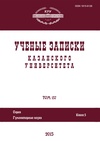Сказание Афродитиана в Толстовском сборнике XIII в.: лексическое своеобразие и проблема локализации перевода
The Tale of Afroditian in the Tolstovskii Sbornik of the 13th Century: Lexical Originality and Localization of Translation
Author(s): Y.A. Pen’kovaSubject(s): Language studies, Lexis, Historical Linguistics, 13th to 14th Centuries, Philology, Translation Studies
Published by: Казанский (Приволжский) федеральный университет
Keywords: Tolstovsky sbornik of 13th century; Tale of Afroditian; lexis; Medieval Slavic translations from Greek;
Summary/Abstract: The paper discusses the vocabulary of the Tale of Afroditian, an apocryphal translation from Greek into Church Slavonic. The Tolstovskii Sbornik of the 13th century contains a full earliest copy of the Tale. The aim of the research is to study the lexical originality of the Tale and, on its grounds, to introduce a hypothesis about the time and place of the first Slavonic translation of the Tale. The former question has never deserved specific attention; the latter one remained controversial. The lexical doublets, which are the characteristics of different translation schools, and infrequent lexis, which is due to the lack of regional lexical features, i.e., no reliable evidence for the localization of this translation, have been analyzed. The vocabulary of the Tale is heterogeneous: Preslav lexis prevails, but the text reflects also some lexical features that are characteristic of other traditions. If compared with the infrequent vocabulary of other Slavonic texts, the Tale can be related to the following early Slavic texts: XIII orations of Gregory the Theologian (Nazianzen), the Chronicle of John Malala, the Russian Primary Chronicle, works of Cyril of Turov and Palea. The translation of the Tale could be made by a South Slavic scribe, however, after the East Bulgarian book center had ceased to exist, i.e., in the beginning of booklore in Old Rus’. The results of the study contribute to our knowledge of the history of Slavic medieval literature, as well as offer an approach for treating the texts, which lack regional features in their vocabulary.
Journal: Ученые записки Казанского университета. Серия Гуманитарные науки
- Issue Year: 160/2018
- Issue No: 5
- Page Range: 1059-1068
- Page Count: 10
- Language: Russian

